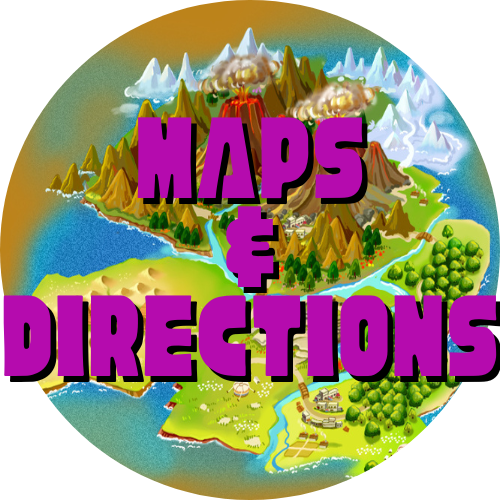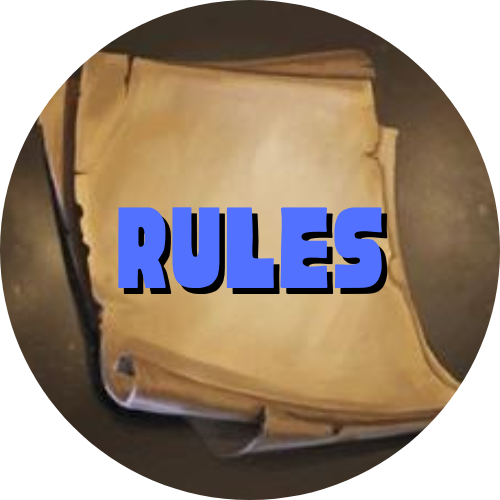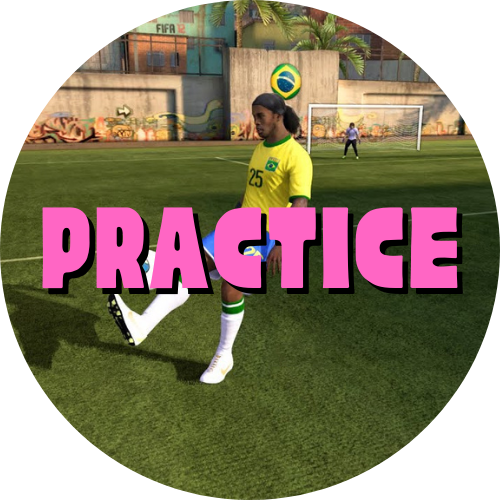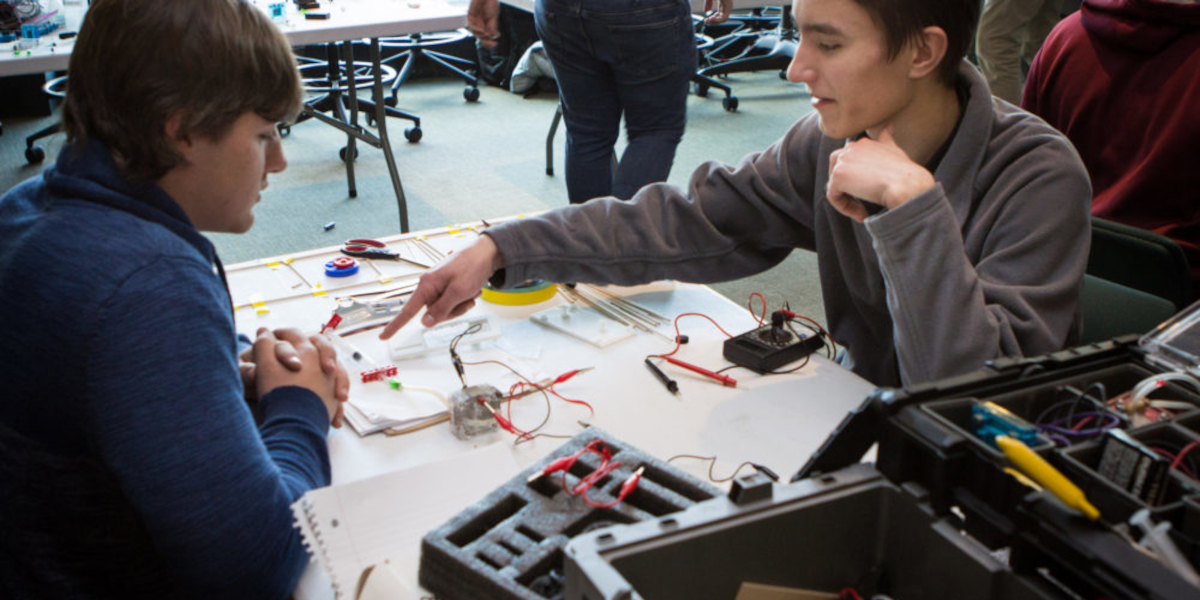
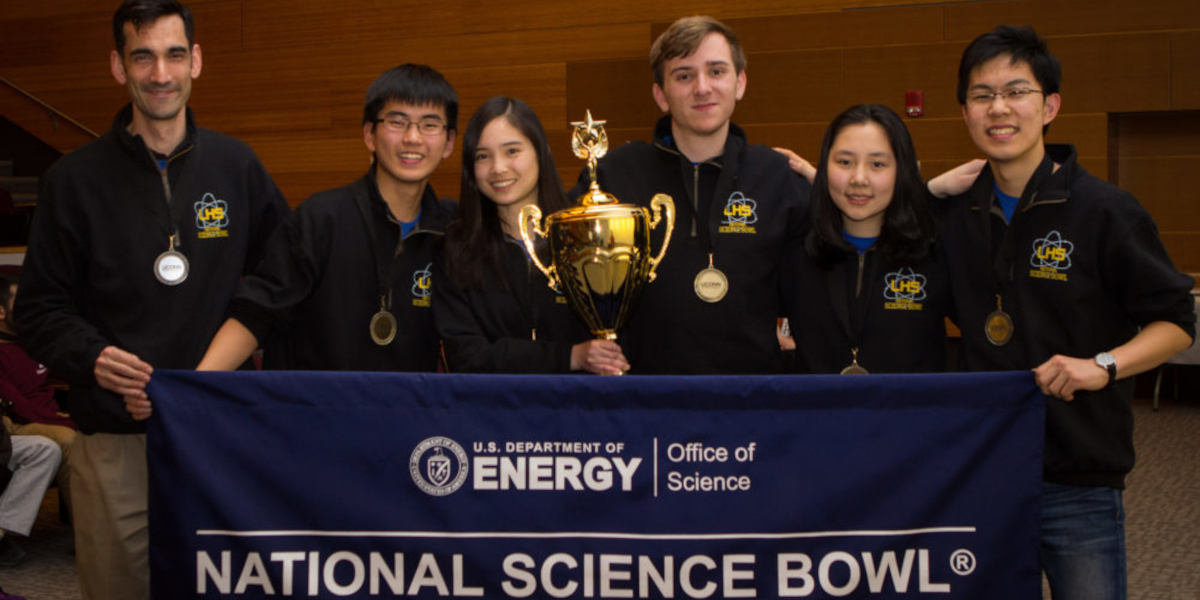
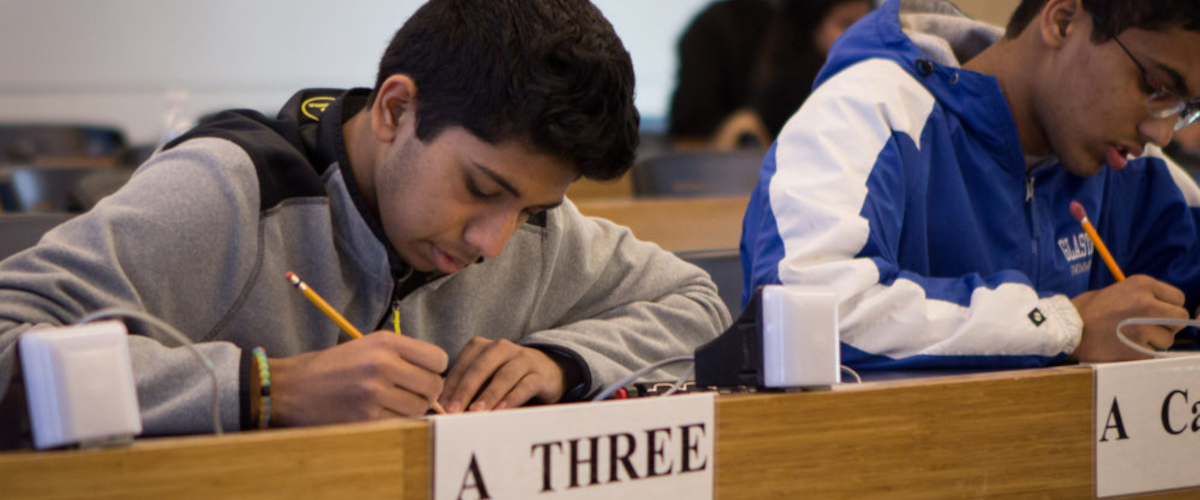
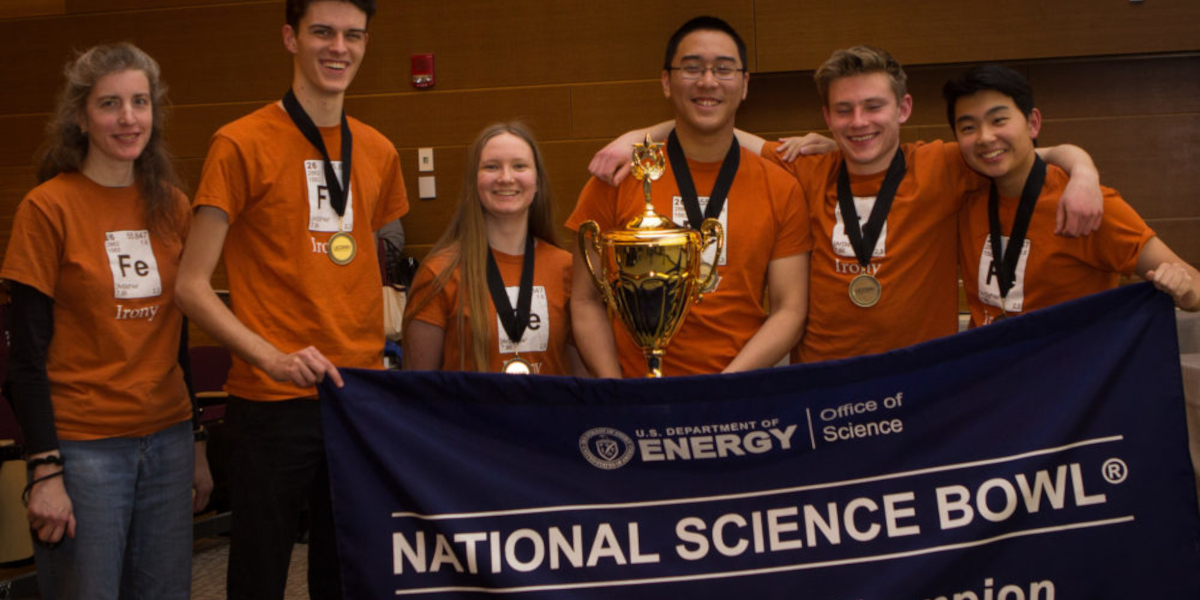

Below are the official rules for the Northeast Science Bowl (available in pdf format). The rules specific to the Northeast Science Bowl can be viewed here. Please review them before you play.
These rules have some clarifications based on how we will be running our regional competition. The changes/clarifications from the National Science Bowl rules are in bold. The most significant changes are in the round robin weighting system we use.
Eligibility Requirements
- Each competing team consists of 4 or 5 student members. (Only 4 will be playing at anytime.) To be eligible to compete, a high school student must be enrolled for the current school year in grades 9, 10, 11, or 12 at the team’s school, and be at least 14 years of age on or before March 4, 2023. A student is limited to at most 4 years of high school competition. A student may not compete in both the middle school and high school events in the same year.
- The National Science Bowl® is a school-based competition. Teams of home-schooled students will be considered to belong to a school as long as each student can provide one of the following items:
- Dated copy of a letter of intent to homeschool from the parent to the state or county in which the student resides
- Copy of the current membership ID to a homeschool association
- Dated proof of purchase of curriculum for the current academic school year. All students on a home-schooled team must live within the geographic boundaries of the team’s assigned regional event.
- All team members must attend the same school. No club teams (community groups, nonschool-based teams) will be approved.
- The National Science Bowl® is a school-based competition. Teams of home-schooled students will be considered to belong to a school as long as each student can provide one of the following items:
- No school may compete in more than one regional competition. No student may compete on more than one team. Coaches must be approved by the schools their teams represent and must be at least 18 years old. No student or coach may compete in or attend more than one regional competition, except that high school students or coaches may attend middle school competitions and vice versa. Each regional coordinator will determine if more than one team from a middle or high school will be allowed to participate in that regional. No more than 3 teams from one middle or high school may compete in a regional event. If a student attends two schools, such as a neighborhood school and a specialty school, that are both participating in regional Science Bowl competitions, then the student must compete on the neighborhood school’s team.
- The winning team from each qualifying regional competition is eligible to be invited to the National Science Bowl® Finals held near Washington, DC, on April 27 – May 1, 2023. In the case that fewer than 4 players from the first-place team can attend and participate in all National Science Bowl® Finals activities, the invitation will be extended instead to the next highest place team from which at least 4 players can attend. To be eligible for the National Science Bowl® Finals, a student must have competed at the regional competition on the team that attends the National Science Bowl® Finals.
- Within 2 weeks after its regional competition or by March 16, 2023 (whichever comes first), the winning team’s coach is required to inform the National Science Bowl® Coordinator of its availability to participate at the National Science Bowl® Finals. During this time of the school year, students are participating in a variety of activities and academic events that may conflict with their participation in the National Science Bowl® Finals (including, but not limited to, state or national athletic or academic tournaments, proms, International Baccalaureate, Advanced Placement, the USAMO, and SAT exams). In the interest of safety, continuity, and maximizing the educational value of the complete National Science Bowl® Finals experience, the National Science Bowl® requires students and coaches to take part in ALL of its events and activities. Therefore, no waivers will be granted or special arrangements made for students to participate in any conflicting activities or exams. If team members are involved in these pursuits, the students will need to determine which activities or events are in their best interests and make their selections within 2 weeks after their regional competition or by March 16, 2023 (whichever comes first). All teams must arrive and depart on the designated dates and participate in all events as scheduled throughout the duration of the National Finals. If fewer than 4 students from the invited regional team are able to participate in all activities at all scheduled times, another team from their regional will be invited to replace them. All team members (students and coach) must travel together to and from the National Finals.
Competition Structure
- Regional competitions have the option of choosing their tournament style, e.g. only double or single elimination, only round robin, or a combination of both. We will be using a combination of both.
- The National Science Bowl® Finals will use a round robin tournament format with several divisions for the preliminary rounds. Teams will be placed in divisions by drawing lots, with the number of teams per division as equal as possible. The number of teams in each division will depend on the number of teams participating in the competition. Each team will play every team in its division. At the end of each round robin match, regardless of the overall score, 2 points are awarded for a win, one point for a tie, and zero points for a loss. The top 2 teams from each of the 8 high school round robin divisions will move on to the seeded double elimination tournament. The middle school double elimination tournament will include 16 teams: the top 2 teams from each of the 6 divisions, plus 4 of the 6 third-place teams. (See Rule 10-1 for further details.)
- For games that occur in the elimination tournaments, if the score is tied at the end of the match, a series of 5 toss-up questions will be used to break the tie. Interrupt, blurt, and communication penalties are in effect during tie-breakers. (See Rules 4-1, 4-2, and 6-2.)
The Questions
- Two types of questions will be used: toss-up and bonus questions. A toss-up question may be answered by any of the 4 members of either team that are actively competing. A team answering a toss-up question correctly will always get a chance to answer a bonus question; the other team is ineligible. No communication among team members is allowed on toss-up questions, but communication is allowed on bonus questions. The high school question categories are: Biology, Chemistry, Earth and Space Science, Energy, Mathematics, and Physics. The middle school question categories are: Life Science, Physical Science, Earth and Space Science, Energy, Mathematics, and General Science.
- No team will have more than one opportunity to answer a toss-up question. If neither team answers a toss-up correctly, the moderator will proceed to the next toss-up question.
- Questions are either multiple-choice or short-answer. A participant may answer a multiple choice question with either the letter answer (W, X, Y or Z) or the verbal answer; however, if the verbal answer is given, it must be exactly as indicated in the question or as read by the moderator. However, when mathematical expressions that would be conventionally written in symbols are the choices, common alternate expressions of the answer shall be accepted. For example, "square root of 2" and "square root 2" would both be accepted; "sine x" and "sine of x" would both be accepted. The determination of whether expressions are equivalent is a judgment call for the officials. The only acceptable answer to a multiple-choice question will be the best of the 4 choices indicated in the question; in the event that more than one of the 4 choices is equally correct, then any of the correct choices will be acceptable. The official list of conventions used regarding questions and answers is contained in the appendix at the end of these Rules.
- Once read in its entirety, a question will not be re-read.
- For toss-up questions, the first player on either team to activate the lock-out buzzer system (or “buzz in”) earns the right to answer the question, except that no player may buzz in until AFTER the moderator has identified the subject area of the question. If a player buzzes in prior to the reading of the subject area, the moderator will inform the player that he/she has buzzed in too soon, and may add time back to the clock, if necessary.
- If the buzzer system demonstrably malfunctions during the play of a toss-up question for which both teams are still eligible, and the officials cannot ascertain which of two players on opposing teams was first to buzz in, the game clock will be paused, the question will be discarded, and the buzzer system will be repaired or replaced. When play is ready to resume, the next toss-up question will be offered to both teams. If this situation occurs on the last question of the round, the officials will obtain a replacement toss-up question.
- On any toss-up or bonus question, the first response given, as determined by the officials, is the only one that counts. However, if a participant gives both a letter answer and a scientific answer to a multiple choice question, both parts must be correct. Any prefacing remarks that do not directly answer the question, such as “my answer is” or repeating the question, will be considered delaying the game and counted as an incorrect answer. (Note: a very short “um”, “er”, or vocal stumble is acceptable, provided the officials do not consider it delaying the game.) The moderator may interrupt a player in the process of giving an incorrect answer at any time, so as to continue the flow of the game.
- If the first team’s answer to a toss-up question is wrong and the question was completely read, the other team is given the opportunity to answer it. The second team is allowed another 5 seconds to buzz in after the moderator indicates the answer is wrong or that a blurt or communication has occurred. (See Rules 4-1 and 4-2.)
- The answer to a bonus question must come from the team’s captain. Moderators must ignore an answer from anyone but the captain on the bonus question. If the moderator inadvertently responds to someone other than the captain while indicating whether an answer is correct, or to the captain before the answer is being given, the next bonus question will be read to the team eligible for the bonus. If this situation occurs on the last question of the round, the officials will obtain a replacement bonus question.
- The team that is not playing the toss-up or bonus question must remain quiet while the opposing team hears and answers the question. If the non-playing team engages in behavior that is visually or verbally distracting, the opposing team will be awarded the following:
-
- For toss-up questions: 4 points for the toss-up question, the option of having 20 additional seconds run off the clock, and the opportunity to answer the bonus question. The moderator will then proceed to the next toss-up.
- For bonus questions: 10 points for the bonus question and the option of having 40 additional seconds run off the clock. The moderator will then proceed to the next tossup.
During each round, each team will be allowed one “accidental” buzz during questions for the opposing team. All subsequent buzzes during questions will be called distractions.
-
Verbal Recognition & Consulting
- The only player who may answer a toss-up question is the one who has buzzed in first. Before answering a toss-up question, the team member who has buzzed in must be verbally recognized by the moderator or scientific judge. (Before the match, the official who will be recognizing participants will be identified.) If a student from a team that has buzzed in answers before being recognized, it is termed a blurt and the moderator will award 4 points to the opposing team, but will not indicate whether the answer was correct or not. The toss-up question is then offered to the opposing team, if still eligible. If the question has not been completely read, the question is reread in its entirety, and the opposing team has an opportunity to answer the toss-up question, and, if correct, a chance to answer the bonus question.
- On toss-up questions, no communication among team members may occur. Prior to buzz: Should communication among any of the team members occur without a team member buzzing in, or if any team member should give an answer without buzzing in, any answer given does not count, the moderator will not indicate whether the answer given was correct or not, and the team loses the right to answer the toss-up question. The question is then offered to the opposing team, if still eligible. After a buzz: If communication occurs, the communication is then classified as a blurt as in Rule 4-1, and 4 penalty points will be awarded to the opposing team.
- If both teams are eligible to answer a toss-up question, a player has buzzed in, and a player from the opposing team gives an answer, the answer of the second player will be treated as communication without buzzing in, as in Rule 4-2. If the team of the player who incorrectly answers was ineligible for the toss-up question, this is treated as a distraction. (See Rule 3-10a.)
- If the moderator inadvertently gives the answer to a toss-up question without giving either team a chance to respond, the moderator will proceed to the next toss-up question. If this situation occurs on the last question of a round, the officials will obtain a replacement toss-up question.
- If the moderator inadvertently gives the answer to a toss-up question before allowing the second team to respond (after an incorrect answer, or an answer given without the team member having been recognized) the next toss-up question will be read to the second team in place of the inadvertently answered question. If this situation occurs on the last question of a round, the officials will obtain a replacement toss-up question.
- On a toss-up question, if the moderator inadvertently recognizes a player other than the one who buzzed in, the player who buzzed in will be allowed to answer as though he/she had been correctly recognized. If the player who was inadvertently recognized answers the question, it will be considered a blurt, with 4 points awarded to the opposing team.
Timing
- The match is played until either the time expires or all of the toss-up questions (and earned bonuses for correct toss-ups) have been read. Regional competitions will have two 8-minute halves with a 2-minute break. Halves at the National Science Bowl® Finals will be 10 minutes with a 2-minute break. Each half begins with a toss-up question. Note: At the National Science Bowl® Finals, some of the High School double elimination rounds will contain visual bonus questions. The rounds containing visual bonus questions will have two 12-minute halves with a 2-minute break. At the National Finals, Double Elimination Rounds Eight and Nine will have 5-minute breaks.
- After reading a toss-up question, the moderator will allow 7 seconds for the 2 teams to respond before proceeding to the next toss-up question. Timing begins after the moderator has completed reading the toss-up question, including all choices on a multiple-choice question.
- A participant who has buzzed in on a toss-up question must answer the question promptly after being verbally recognized by the moderator or scientific judge. After recognizing a participant, the moderator will allow for a natural pause (up to 2 seconds), but if the moderator determines that stalling has occurred, it will be treated as a wrong answer.
- After a team member has answered a toss-up question correctly, the team is given the opportunity to answer a bonus question. The team will have 20 seconds for its captain to begin to give its answer to the bonus question; timing begins after the moderator has completed reading the bonus question, including all choices on a multiple-choice question. Note: On visual bonus questions at the National Science Bowl® Finals, the team will have 30 seconds for its captain to begin to give its answer to the visual bonus question.
- On a bonus question, the signal “5 SECONDS” will be given by the timekeeper after 15 seconds of the allowed 20 seconds have expired. Additionally, the timekeeper will indicate the end of the 20-second bonus period by saying “TIME.” If the team captain has not begun the response before the timekeeper calls “TIME,” the answer does not count. If the team captain has begun the response, he/she may complete the answer, but must proceed through it without stalling. Note: On visual bonus questions at the National Science Bowl® Finals, the signal “5 SECONDS” will be given by the timekeeper after 25 seconds of the allowed 30 seconds have expired.
- If a toss-up question is begun before time expires in a half, that question will be finished under the usual rules of play, including the bonus if the toss-up is answered correctly. The half is then over. A question will be considered to have been begun if the subject area has been completely read. The second half will begin with the first toss-up question not read in the first half.
Summary of Timing - Regional Events
| Type of Question | Time Allowed |
| Toss-up | Teams have 5 seconds to buzz in after question is read. If no team has buzzed in, say “TIME”. |
| Toss-up: Buzz in after Toss-up has been read | Must answer within natural pause (up to 2 seconds). If no answer, say “TIME”. |
| Bonus | Team gets 20 seconds to discuss. After 15 seconds, Timer will announce “5 seconds”. If no answer after 20 seconds, say “TIME”. |
| End of Game | Each half is 8 minutes. At 8 minutes, say “Game”. If team is in process of answering a question, just turn off the clock and announce “Game” when process of the question has been completed. |
Scoring
- Toss-up questions are worth 4 points, and bonus questions are worth 10 points.
- If a toss-up question is interrupted, the player is recognized, and the answer is correct, the team will receive 4 points. If the answer is incorrect, or if a player from the team buzzing in answers without being verbally recognized, or if communication occurs on the team buzzing in, 4 points are added to the opposing team’s score, the question is reread in its entirety, and the opposing team will be given an opportunity to answer the toss-up question, and, if correct, the chance to answer the bonus question.
- The double interrupt. If a toss-up question is interrupted and a team incurs a penalty as in the previous rule, 4 points are added to the opposing team’s score. The moderator will then proceed to re-read the question in its entirety. However, if the opposing team buzzes in at any time before the re-reading is completed and subsequently incurs a penalty as in the previous rule, 4 points are added to the first team’s score, and the moderator will proceed to the next toss-up question.
Summary of Scoring
| Type of Question | Points Awarded |
| Correct Toss-up Incorrect Toss-up |
+4 points & eligible for bonus question +0 points |
| Correct Bonus (or distraction by nonplaying team) Incorrect Bonus |
+10 points +0 points |
| Interrupted Toss-up: - Correct Answer - Incorrect Answer |
+4 points & eligible for bonus question +4 points to opposing team |
| After a team member buzzes in: - Unrecognized Toss-up (Blurt) - Unrecognized Interrupted Toss-up (also a Blurt) - Communication among players |
+4 points to opposing team |
| Before a team member buzzes in: - Answering a toss-up - Communication among players |
+0 points, but team is disqualified from answering the toss-up |
Challenges
- Challenges must be made before the moderator begins the next question, or, for the last question of a half, within 3 seconds of the end of that half. No challenges may be made during the play of a question. All challenges must come from the 4 members of each team who are actively competing. The fifth team member, coach, and others associated with a team may not become involved in challenges or their discussion. If anyone associated with a team, other than the 4 active team members, initiates or discusses a challenge, the team will have the challenge ruled against it. All decisions of the judges are final. Note: Regardless of subsequent questions having begun, issues involving scoring errors or game clock management can be initiated by anyone in the room, until the game officially ends, three seconds after the final question is over. If such issues can be resolved, they may be corrected by the officials. These error corrections are not “challenges”, they are “corrections”.
- Challenges may be made either to scientific content (i.e., whether an answer is scientifically correct or not) or to the administration of the rules (e.g., whether the timing or scoring is correct). Challenges may NOT be made to judgment calls by the officials, including but not limited to whether a question has been interrupted, whether 5 seconds have elapsed before a student buzzes in on a toss-up, whether 20 seconds have elapsed before a captain begins answering a bonus, whether the non-playing team has engaged in distracting behavior during a question, whether a half has expired before a new toss-up question begins, whether a stall or blurt has occurred, whether players have communicated during a toss-up, whether a player has given a first response, whether an answer has been pronounced correctly, whether an answer to a multiple-choice question is exact, whether time should be added back to the clock, or whether a non-playing audience member has shouted an answer, including whether the shouter is associated with one of the 2 teams.
- Challenges to scientific content will be limited to 2 unsuccessful challenges per team per round, including tiebreaker questions. Successful challenges do not count against this limit. After the second unsuccessful challenge for a team during a round, that team will not be allowed any further challenges to scientific content during that round. Challenges to rules may be made at any time; however, whether a scientific challenge has been made and whether it has been successful are judgment calls, and may not be challenged, as per Rule 7-2.
- Should a question or challenge arise during a match, the match and the clock will be stopped until the question is resolved. Once the question has been resolved, the match will continue from that point. Should the moderator decide that some time was lost due to the interruption in play, an appropriate amount of time will be put back on the clock. Questions, score or timing corrections, and challenges may only be made: a) after BOTH teams have had the opportunity to answer a toss-up question and before any subsequent bonus question begins or b) after the completion of a bonus question and before the next toss-up question.
- If a team’s answer to a toss-up question is judged incorrect, and they wish to challenge the ruling on the basis of scientific content, but the opposing team is still eligible for the toss-up, the first team must hold its challenge until after the opposing team has completed its toss-up opportunity. The first team should then state its challenge before the next bonus or toss-up question is read. If the challenge is denied, play will proceed as usual from the end of the second team’s answer. If the challenge is upheld, the second team’s answer will be disregarded and the time lost since the first team’s answer was disallowed will be put back on the clock. The first team will then be awarded 4 points and have the opportunity to answer the bonus question.
Miscellaneous Rules
- Substitutions may be made only at the half. If a team has 5 players, the player who did not play in the first half may substitute for any of the 4 starters. Teams may switch captains, but only at the half.
- No one in the audience may communicate with participants during the match; communication will result in ejection from the competition room. The officials may clear the room of coaches, alternates, and observers if communication is suspected. If someone in the audience shouts out an answer, and the team with which the shouter is associated can be determined, that team will forfeit the match. If the shouter cannot be determined by the officials to be associated with either team, the room will be cleared of everyone other than the officials and the eight players currently playing; the officials will add time back to the clock, and the question will be replaced with the next toss-up or bonus (whichever is appropriate). If this occurs on the last question of a round, one additional toss-up and/or bonus question will be obtained to finish the game. (Note: at the National Finals, the room will not be cleared during Double Elimination Rounds Eight and Nine.)
- Prior to each match, the two team coaches will introduce themselves to each other and will sit together toward the back of the competition room.
- No notes may be brought to the competition table. Nothing may be written before the clock starts. Scratch paper will be provided at the beginning of each match and collected at halftime and at the conclusion of the match.
- Calculators and electronic devices are not permitted during play. The team of a player using such devices during play will be disqualified from the tournament.
- Coaches, non-playing team members, and spectators will not write down the questions or answers the moderator reads or use any electronic recording or transmitting device, including digital cameras, cell phones, or computers during the match. At the National Science Bowl® Finals, coaches will be provided with a team score sheet to track the number of questions answered by each individual student on their team. No one else in the competition room is permitted to write or make notes of any kind during the active competition (other than the competing players). If this occurs, the individual(s) will be asked to leave the competition room.
- No cell phones or electronic devices may be used by students, coaches, or spectators once the match has started, including during the break between the two halves. If any electronic device is audible during the match, the person possessing the device must leave the room for the rest of the match.
- At all times, players and coaches should conduct themselves with honor and good sportsmanship. The Tournament Director may disqualify any player, coach, or team engaging in conduct judged to be detrimental to the National Science Bowl®.
Rules for Determining Round-Robin Scores at Northeast Science Bowl
- Every team will always get the points equal to their score for the match
- A win will add 100 points to that score
- A tie will add 50 points to that score
- A loss will add 50 points minuse the number of points the team lost by to a minimum of zero (examples below):
- Lose by 1 point → add 49 points
- Lose by 40 points → add 10 points
- Lose by 60 points → add 0 points
- These scores will be added up for all five round-robin rounds in the morning and be used to determine seeding/elimination for afternoon rounds and the wildcard rounds
- Each team will also recieve an additional 2.11% divisional strength bonus***
- ***Divisional strength bonus = 2.11% of Division total score (the sum score of all 6 teams within the same division using rules 1-4)
To choose the 16 teams going into the double elimination championship rounds:
- NORTH and SOUTH: the 2 top scoring teams in each of the divisions advance (14 in, 2 to go).
- NORTH and SOUTH: the next 2 top scoring teams, regardless of division, advance.
- A maximum of two teams per school can advance to the championship round.
- The championships will be double elimination.
Championship Rounds Ties:
- OVERTIME: Five Tossup questions
- SUDDEN DEATH: One Tossup question at a time, first to score
WILDCARD
The Wildcard Championship will have 60 teams separated into 10 divisions. Each team plays 5 games against divisional foes. We will use the same scoring rubric as the morning rounds. After 5 games the top 8 scoring teams regardless of division will advance to the single elimination Wildcard championships, see page 18 & 24.


